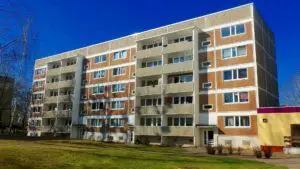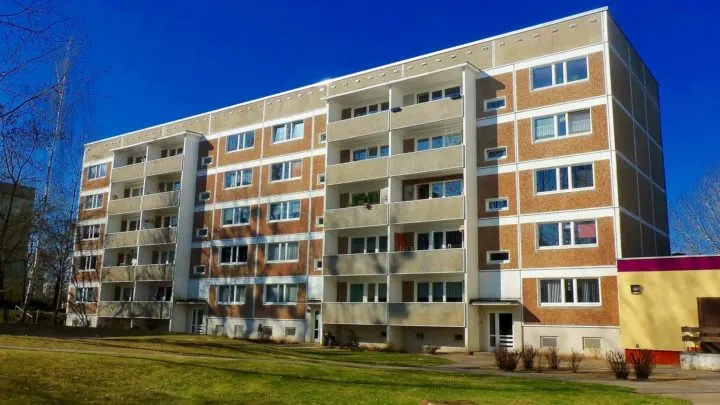If you’re looking at renting, you might have heard the term rent control. While this is a very common term, it can also be confusing for some people who are not used to it. Let’s get a little more familiar with it!
Want to learn more about renting, moving and more? Check this out!

What is rent control?
Rent control simply means the government disallows landlords from gouging their tenants with very high rent prices. It is a way to protect people from having to pay extremely high rates for rent and allows landlords to keep the same paying tenants in their apartments for years.
You may also have heard rent control referred to as rent stabilization. The two phrases mean the same thing. They both give landlords the chance to only raise rent by a certain pre approved percentage each year. The percentage is usually governed by market rates and can change depending on different economic factors in your city at different times.
Basically, rent stabilization means your landlord can’t raise your rent just because they want to start making more money or because they want to push their “poor” tenants out of the building.
In some cases rent control means your rent amount is frozen. While this happened decades ago, it is incredibly uncommon in today’s economy.
How does rent control work?
Rent control is set by a governing body. The government sets up a rent board that determines which buildings are going to be subject to control, how much they can raise the rate and what factors they can take into consideration when they’re looking at market rates. The people who are on the board look at different factors and are chosen because they are supposed to be unbiased toward both tenants and landlords.
In general, rent stabilization only applies to people who are already living in the building. When new tenants move in, landlords might be able to choose the amount they charge for rent. They can charge a lot over the market rate. In some cases, the rent board determines the percentage landlords can charge new tenants above the rent-controlled current rent amount.
There may be some buildings that are off-limits for rent stabilization. These limits are usually determined by the age of the building. Luxury apartment buildings and speciality buildings might also be exempt from rent stabilization.
One of the easiest ways you can get a rent-controlled apartment as a new tenant is by moving in with a roommate who already lives in an apartment that is rent controlled. Some apartment buildings might have specific requirements, but this is sometimes the best way to ensure you will not be charged very high amounts for rent.
Where does it happen?
Rent control is typically only available in very expensive cities. Unfortunately, small cities and small towns do not typically have laws about rent stabilization. The good news is, though, in these cities it’s often less expensive to find an apartment.
Even though it isn’t a law in other areas, some buildings or landlords might create their own rent stabilization that will be included with leases. This can benefit you as a tenant and benefit them as a landlord. You’ll receive the benefit of knowing your rent won’t go up by thousands of dollars. They’ll receive the benefit of generally happy tenants who stay.
At the time this article was written, the only states that currently have laws for rent control are these:
Of these states, only select cities have rent control. The laws are always changing, though, and more states could pass laws that allow for rent stabilization.
Why do people love rent control?
The most obvious benefit of rent control is saving money on rent. Tenants get the opportunity to live in a high-cost area without the outrageous cost of housing that’s often associated with it. This can be helpful for people who live in a very expensive area and don’t have options for moving out of it. It can also be helpful if you want to stay in one place for a long time. In cities that do not have stabilization, rent could go up by hundreds of dollars every year (and, in some cases, thousands of dollars).
While rent stabilization is not a guarantee that you’re going to have a landlord who cares about you, having it might make landlords more compassionate toward different situations. The rent board might also put other policies into place that protect you in addition to the rent stabilization ones.
And why do they hate it?
When you hear about rent control issues in the news, many people talk about how it is bad for a city’s economy. This can be true in some instances. Many people who hate rent stabilization don’t actually hate the idea of it. They hate what it does to the communities. When landlords are forced to control the rent to their buildings, they might be concerned they’re going to lose money. Instead of accepting the new policies and controlling the amount of rent they charge, they simply choose to convert their buildings into condos. They sometimes also tear them down to build a new property.
Since they won’t be required to maintain the policy for controlling rent on these type of properties, they think it safeguards them. While it does, it also forces people who were living in those apartments out of their home. This can lead to people moving out of the city and creating a higher demand for housing. It can even contribute to homelessness within the city.
While the idea of rent control is a huge economical and ethical issue, the people who hate it are typically ones who have been removed from their homes because of it and people who are not going to benefit from it in any way.
Can you get rent control in your city?
Since rent control can cause issues we talked about in the previous section, you will need to take the time to figure out if you think it will actually benefit your city. If you think it will and it’s something you’re very interested in, you might be able to take action. Here are a few ways you can try to help make getting rent stabilization in your city easier:
- Find groups in your city that are already dedicated to this task.
- Sign a petition to get it.
- Start a petition to get it in your city.
- Attend public forums, city meetings and anywhere else you can have your voice heard.
- Team up with organizations that are trying to make cities better.
While it won’t happen overnight, there is a very real chance you could help contribute to rent stabilization in your city. If it is something you feel is important and something you’d actually like to see happen, you can take action! (And, bonus, it probably won’t cost you a dime to join support groups and sign petitions).
Good news! If you’re tired of learning about rent stabilization, dealing with nasty landlords and feeling like you’ll never get caught up, there could be hope! Even as a low-income individual, you might be able to buy your own house. The other good news? Buying might actually be cheaper in rent controlled areas! Check out the resources we’ve found for potential home buyers!

